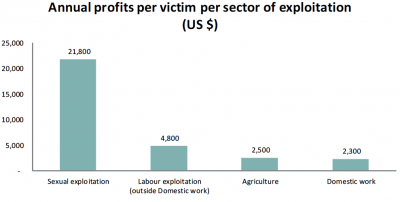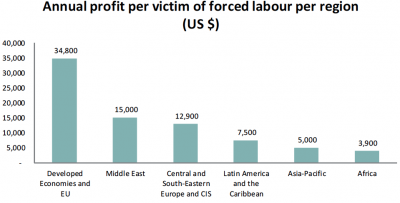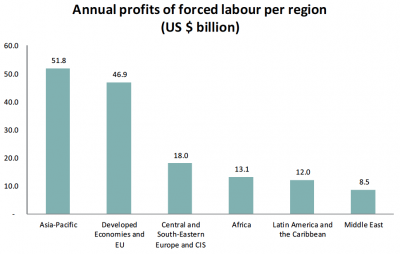A new report underscores how profitable and widespread modern-day slavery has become. The U.N. International Labor Organization (ILO) this morning estimates that trafficking generates $150 billion in illicit profits each year. The figure is three times more than previously estimated.
The ILO report, Profits and Poverty: The Economics of Forced Labor, says two thirds of the profits – about $99 billion – comes from sex slavery, while another $51 billion comes from forced labor slavery such as domestic work, farming, mining, fishing, construction and logging.
“This new report takes our understanding of trafficking, forced labor and modern slavery to a new level,” said ILO Director-General Guy Ryder.” Forced labor is bad for business and development and especially for its victims. Our new report adds new urgency to our efforts to eradicate this fundamentally evil, but hugely profitable practice as soon as possible.”
The ILO says “income shocks and poverty” are the main economic factors that push individuals into slavery. Other factors include a lack of education, illiteracy, gender and migration.



“We must now focus on the socio-economic factors that make people vulnerable to forced labor in the private sector,” said Beate Andrees, head of the ILO’s Special Action Program to Combat Forced Labor. Andrees called for a series of measures:
- Bolstering social protection floors to prevent poor households from abusive lending or indenture in the event of sudden income shocks;
- Investing in education and skills training to fortify job opportunities for vulnerable workers;
- Promoting a rights-based approach to migration to prevent irregular employment and abuse of migrant workers; and
- Supporting the organization of workers, including in sectors and industries vulnerable to forced labor.
“If we want to make a significant change in the lives of the 21 million men, women and children in forced labour, we need to take concrete and immediate action,” the ILO Director-General said. “That means working with governments to strengthen law, policy and enforcement, with employers to strengthen their due diligence against forced labour, including in their supply chains, and with trade unions to represent and empower those at risk.”
Free the Slaves Programs Director Karen Stauss says the new report underscores the need to increase funding to combat modern-day slavery. “Trafficking is one of the world’s largest criminal enterprises and the estimate of its profitability continues to rise, yet the level of funding to combat it has not kept pace and remains remarkably low,” Stauss says. “Slavery can be conquered if governments, international institutions, foundations, corporations and civil society join together to marshal the funding and political will to get the job done.”
